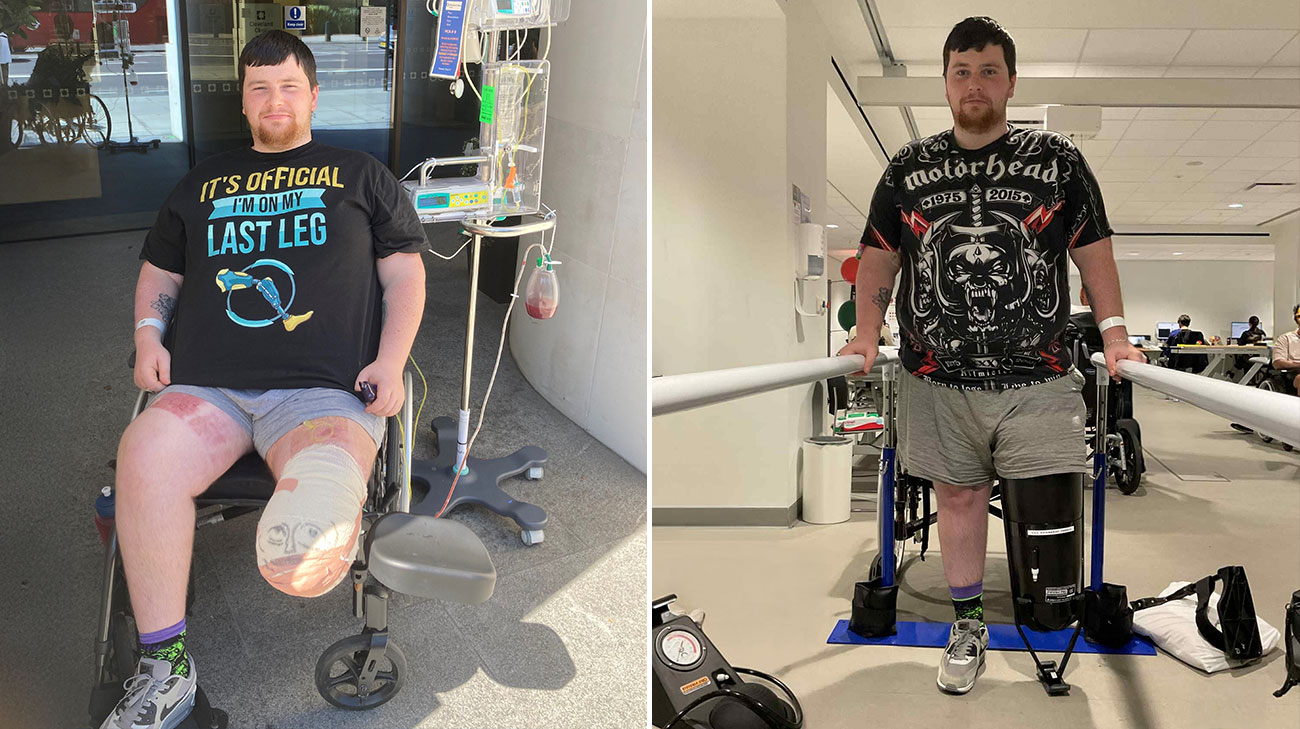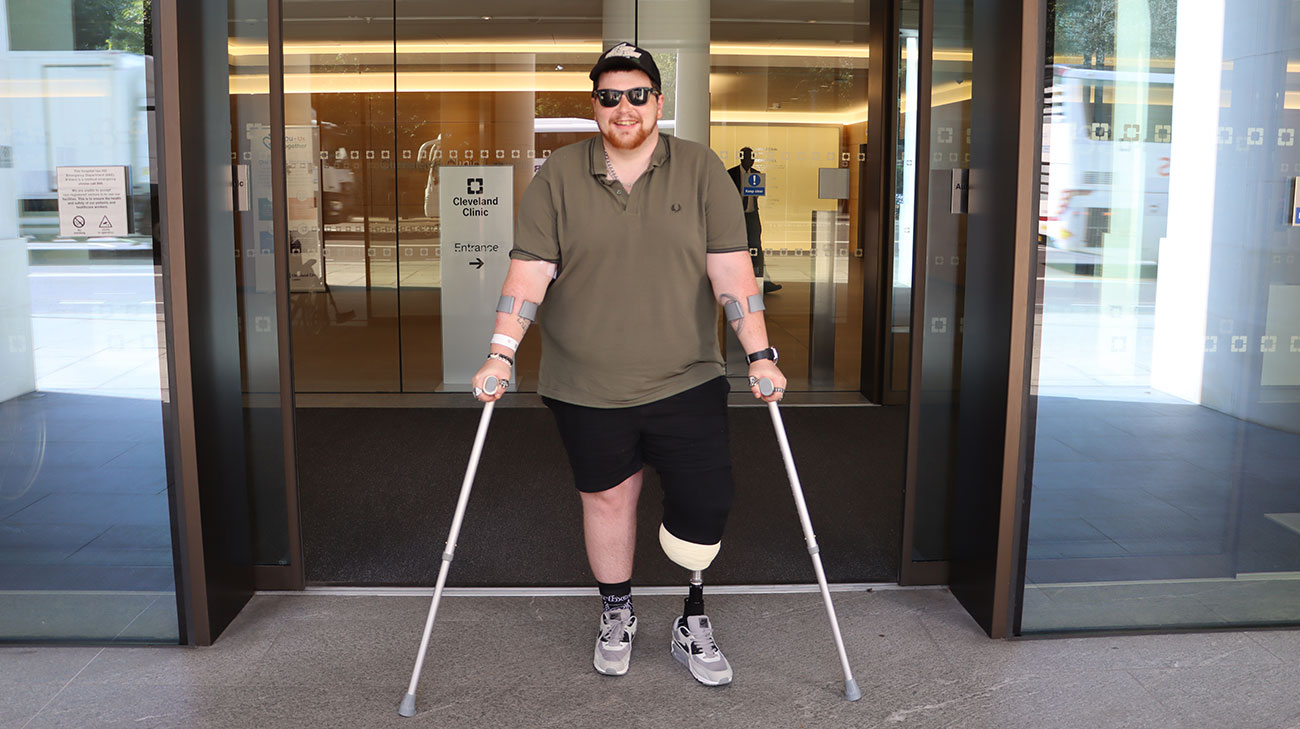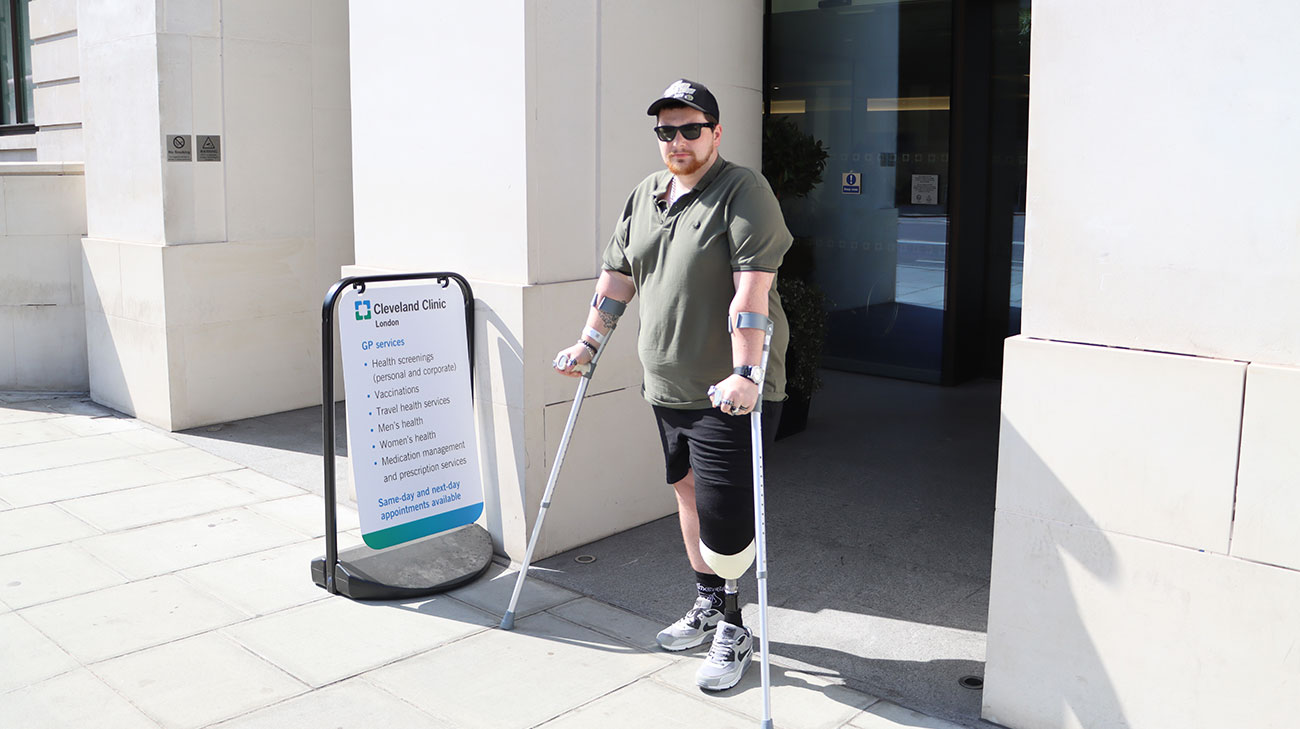
When 25-year-old Jordan Collins climbed onto his motorbike in July 2024, he could not have imagined how drastically his life was about to change. Hit broadside and thrown clear of his bike, Jordan was left with six broken ribs, two punctured lungs, a lacerated liver and kidneys, four broken vertebrae, a fractured skull, a shattered leg and a severe head injury.
“I suffered three cardiac arrests and lost 21 pints of blood over the course of just a few days,” Jordan recalls.
Although today he can rattle off his injuries like an expert, Jordan remembers nothing of the first six weeks following the crash because he spent that time in a coma in an NHS intensive care unit (ICU).
A long road of setbacks
After three and a half months, Jordan was stable enough to be discharged. But within days, his recovery began to spiral backwards.
“I became very unwell almost immediately and ended up back in my local hospital for another three months,” he says. “I was in and out of ICU because I would become septic. I wasn’t gaining any weight; I couldn’t keep food or medication down because I was vomiting so much, and my wounds weren’t healing.”
What Jordan had hoped would be a steady path towards becoming strong enough to undergo surgery to amputate his severely damaged leg instead became an exhausting cycle of infections, hospital stays and setbacks.

Seeking care at Cleveland Clinic London
Determined to get better, Jordan and his family sought care at Cleveland Clinic London, hoping their team could help stabilise and strengthen him enough to withstand the amputation.
On 2 January 2025, Jordan was transferred to the hospital’s rehabilitation unit under the care of Dr Emer McGilloway, Consultant in Rehabilitation Medicine.
“Before Jordan came to us there was already a plan for amputation,” Dr McGilloway explains. “But he wasn’t well enough to have the surgery. It was felt that he might not heal, or even survive, because of how ill he was.”
Within five days of admission, Jordan was back in ICU with another episode of sepsis. Knowing something deeper was wrong, Dr McGilloway pushed for further testing. The team soon discovered that Jordan’s pituitary gland, which controls hormones and thyroid function, had been irreparably damaged in the crash.
“For Jordan, coming to Cleveland Clinic London was lifesaving,” says Dr McGilloway. “His pituitary function was the lowest I’ve ever seen. Once we started hormone replacement therapy, the transformation was extraordinary. His hair grew back, he gained weight, his blood pressure stabilised. He felt so much better.”
Three days after starting hormone therapy, Jordan stood for the first time in months.
“I stood eye to eye with my mum and we both burst out crying,” he remembers.
Rebuilding his strength and confidence
Jordan could now focus on his goal: to become strong enough to have his leg amputated, be fitted with a prosthetic and start walking again. Achieving that required a multidisciplinary rehabilitation programme tailored to his complex needs.
His care team included physiotherapists, occupational therapists, dietitians, speech and language therapists, psychologists, surgeons and endocrinologists.
“He needed every one of them,” says Dr McGilloway. “From improving arm movement and core strength, to helping him sit up, transfer from bed to chair, and eventually build his balance to bear weight. It was about rebuilding him from the ground up.”
At first, Jordan could tolerate only short therapy sessions due to fatigue and pain. Gradually, his schedule grew to include four or more hours of daily activity — gym sessions, bedside stretching, cardiovascular exercise and light weight training.
Psychological support was also an important part of his care. Initially, Jordan could not bear to look at his injured leg. With guidance, he learned to confront the reality of amputation, prepare emotionally for the change and even began to research the experiences of other amputees himself.
“The mindset piece was critical,” Dr McGilloway explains. “This was a life-changing injury and helping Jordan adapt was as important as the physical therapy.”

Preparing for amputation
Initially, doctors believed Jordan would need an above-knee amputation. But thanks to months of stretching, wound healing and strengthening, the team managed to preserve his knee — giving him the chance of a below-knee prosthetic.
“That makes a huge difference,” says Dr McGilloway. “An above-knee amputation can require three to four times more energy to walk. Preserving the knee gave Jordan the best possible outcome.”
The procedure was carried out over two surgeries that took place in June and July 2025. The first reshaped the damaged limb, and the second completed the definitive amputation. Jordan’s surgeries were led by Mr Asmat Din, Consultant Plastic Surgeon, Mr Ash Vasireddy, Trauma Lead and Orthopaedic Surgeon, and Mr Aaron Saini, Consultant Orthopaedic Trauma and Limb Reconstruction Surgeon. Jordan was especially pleased the surgeons were able to save the tattoo on his left leg.
After the amputation, Jordan began early training with a temporary support aid before being fitted with a custom socket and prosthetic leg under the expert guidance of Dr Vijay Kolli, consultant in amputee rehabilitation at Cleveland Clinic London.
The role of family
Throughout his journey, Jordan’s family, especially his mother, Shayla, played a vital role.
“His mother was his secret weapon,” Dr McGilloway says. “She’s a nurse herself, and she knew when something wasn’t right. She pushed for the best care and supported him through every stage. Having his family as part of the rehab team made all the difference.”
Jordan agrees: “My mum kept me going. I wouldn’t be here without her.”
A bright future
Today, Jordan is adjusting to life with a prosthetic and planning for the future.
“I was angry that I had to lose my leg,” he admits. “But if I had kept it in the condition it was in, I wouldn’t have walked again. I would have had to endure lifelong pain and further surgeries. Now, I can move on with my life.”
Jordan’s plans include enrolling in college to earn a qualification in welding, restoring his beloved motorbike, and building a meaningful career.
“This accident made me realise that anything can happen at any time,” Jordan says. “I want to live my life with purpose and make something meaningful of it.”
“He came to us desperately unwell,” says Dr McGilloway. “To now see him planning his next steps is remarkable. Jordan is an example of what’s possible with expert care, a supportive family and determination.”
Reflecting on his stay, Jordan says, “Cleveland Clinic London is like a 5-star hotel. My room was three times bigger than my bedroom at home. My bathroom was a good size. The food was amazing. If you’ve got specific dietary needs, they will cater for them.”
“In addition to the brilliant care I received from my doctors, nurses and therapists, those amenities and being in an atmosphere where you feel cared for make all the difference,” he adds.
Related Institutes: Orthopaedic & Rheumatologic Institute

